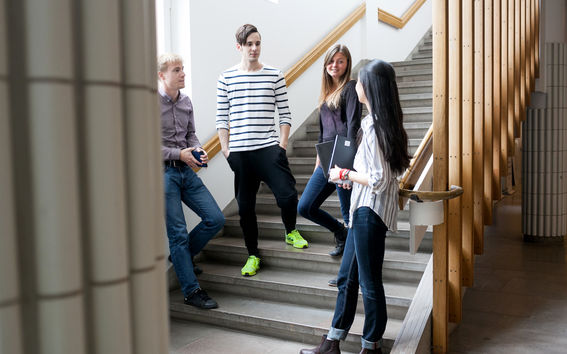What skills and knowledge are the most important ones for students to learn and take with them to working life?
‘Clear communication, and the ability to prioritise and focus on key issues is something I think is very important,’ says Suzanne Innes-Stubb, who begins teaching in February as Executive in Residence at Aalto University School of Business.
‘You need to know your stuff, but you also need to be able to communicate it in a very short and clear way because people in business are not going to read through a long document. If you’re trying to get a message across to the executive board or the CEO, you’ll have five minutes to do it, and you will really need to hit all the key messages in that time. So that may be quite an adjustment for students.’
Suzanne Innes-Stubb teaches a course in business law, Ethics and Compliance for International Business. She has extensive experience in the field from both the public sector and the business world. For students, her aim is to teach the ability to identify when an organisation’s operations may be questionable and the courage to address it by, for example, asking questions or reporting clear violations of regulations.
‘I hope that the students will become like ambassadors for ethics and compliance whatever their future work environment is,’ says Innes-Stubb.
One of the main goals for the leading work-life expert is to build connections between the academic world and the business community. Innes-Stubb's experience supports this task well, as she has worked in ethics and compliance for two companies, and as a lawyer in private and corporate settings, as well as for the British government.
‘It is great that the university has created these positions because the academic environment differs in many ways from the commercial world, and it is very important for students to understand what it's like outside the university. On the other hand, creating connections between these two work environments can also provide insights for academic colleagues at the university,’ says Innes-Stubb.
‘I believe that my previous experience will be beneficial in helping students understand what it is like to work in the business world in ethics and compliance focused roles,’ she says.
Examples from the business world
The pace in the business world is often faster than in the academic world, and there is not as much time to delve into details thoroughly. Therefore, practical exercises are conducted in the course to prepare students for working in the business community. One of the assignments is a five-minute video presentation where students give a presentation on a specific topic for a fictional audit committee. They prepare the topic in advance, record their presentation and submit the assignment. The assignment mirrors a real situation that Innes-Stubb has often experienced herself.
'I can’t count the number of times I have prepared a 15-minute presentation for an audit committee, only to suddenly find out that I only have five minutes. In such a situation, you must be able to summarize and ensure that you convey the central messages,’ she says.
Students also complete a group assignment where they create a compliance investigation plan. When creating the plan, they must consider implementation from various perspectives and plan the practical execution: who they will interview, in what order and what they will communicate to the CEO.
Another way to incorporate the business world into teaching is by inviting guest lecturers to share their perspectives on the subject. One of the guests will speak about conducting a compliance investigation in practice. Another will share his experiences of an investigation that led to a prison sentence.
‘The latter speaker's story about the impacts on his personal life, career and mindset will undoubtedly make an impression,’ says Innes-Stubb.
A dynamic and evolving field
When preparing her teaching materials, Innes-Stubb has had time to think much more deeply than during the past ten years working within companies.
‘It has been very nice to have the time to think. I believe that companies may sometimes make a mistake by not making time to really think,’ she says.
Ethics and compliance are sometimes considered boring, but according to Innes-Stubb, that perception is inaccurate. The field also suits various educational backgrounds, including economics and business.
‘The number of topics and the range of activities that you can get involved in show that it is a very dynamic, developing and growing field,’ she says.
‘I also believe it is very important to have people with different backgrounds and education in the field since the work requires a broad perspective. For instance, I’ve worked with experts in economics, finance, internal control, marketing and logistics, and they have all contributed very valuable insights to compliance work.’
Broad perspective is a strength
Global challenges such as artificial intelligence, climate change and issues with global supply chains will continue to impact the work of ethics and compliance.
‘The EU's sustainability legislation is evolving, and both the EU's Corporate Sustainability Due Diligence Directive (CSDDD) and the Corporate Sustainability Reporting Directive (CSRD) will have a significant impact on the work of ethics and compliance,’ says Innes-Stubb.
Social and administrative issues will be especially important, whether it's about combating bribery and corruption, whistleblowing channels or human rights.
‘Artificial intelligence has a major impact, particularly on human rights. The effect is seen both in terms of employees and in how companies use artificial intelligence in relation to other stakeholders. I believe we have only just seen the beginning of this,’ she says.
For Suzanne Innes-Stubb, having a broad perspective regarding other people is one of the most important attitudes that young ethics and compliance professionals entering the workforce need.
‘Don’t come in with a very fixed view of what a certain company does, what other people's roles and tasks are, or what your own role is. Instead, you should try to see the bigger picture. It’s also good for companies to understand that their operations cannot just be about profit-making, because if a company acts wrongly, the effects on society, investors and customers — or the ability to recruit — can be significant,’ she says.
‘Also, from an individual perspective, having a broad mindset about people around you is important. Diversity, equity and inclusion have intrinsic value, but you also get the very best ideas when you are talking to people who are not like you,’ she concludes.















